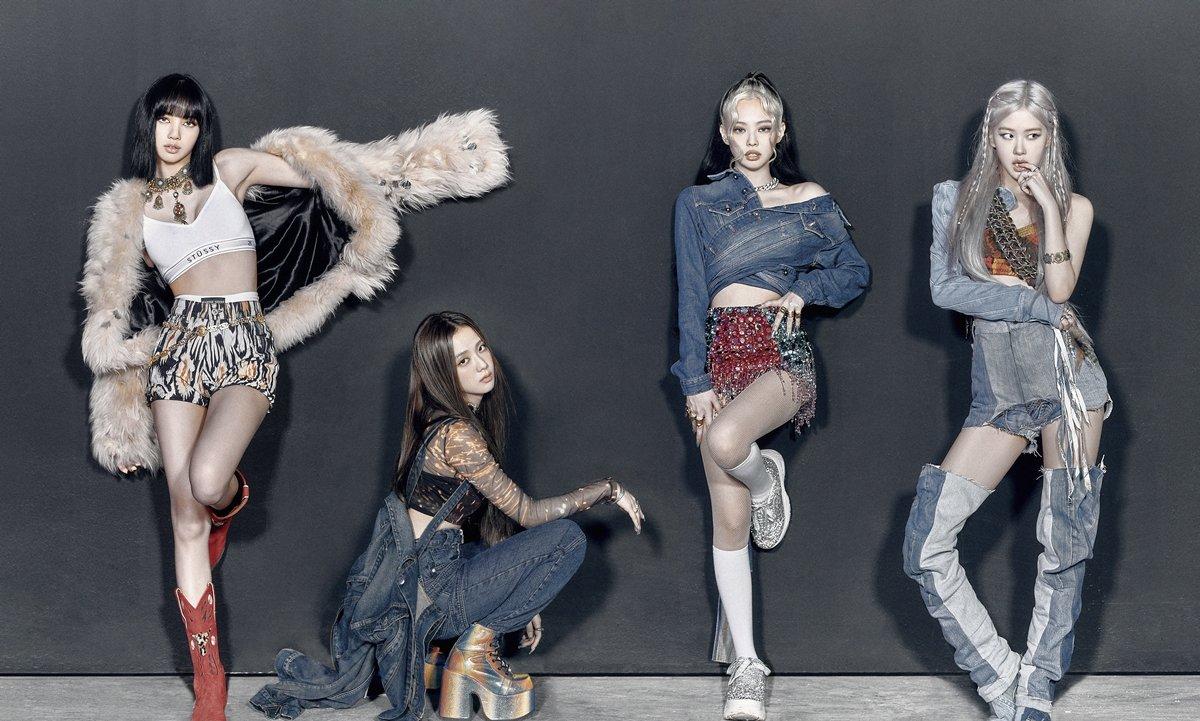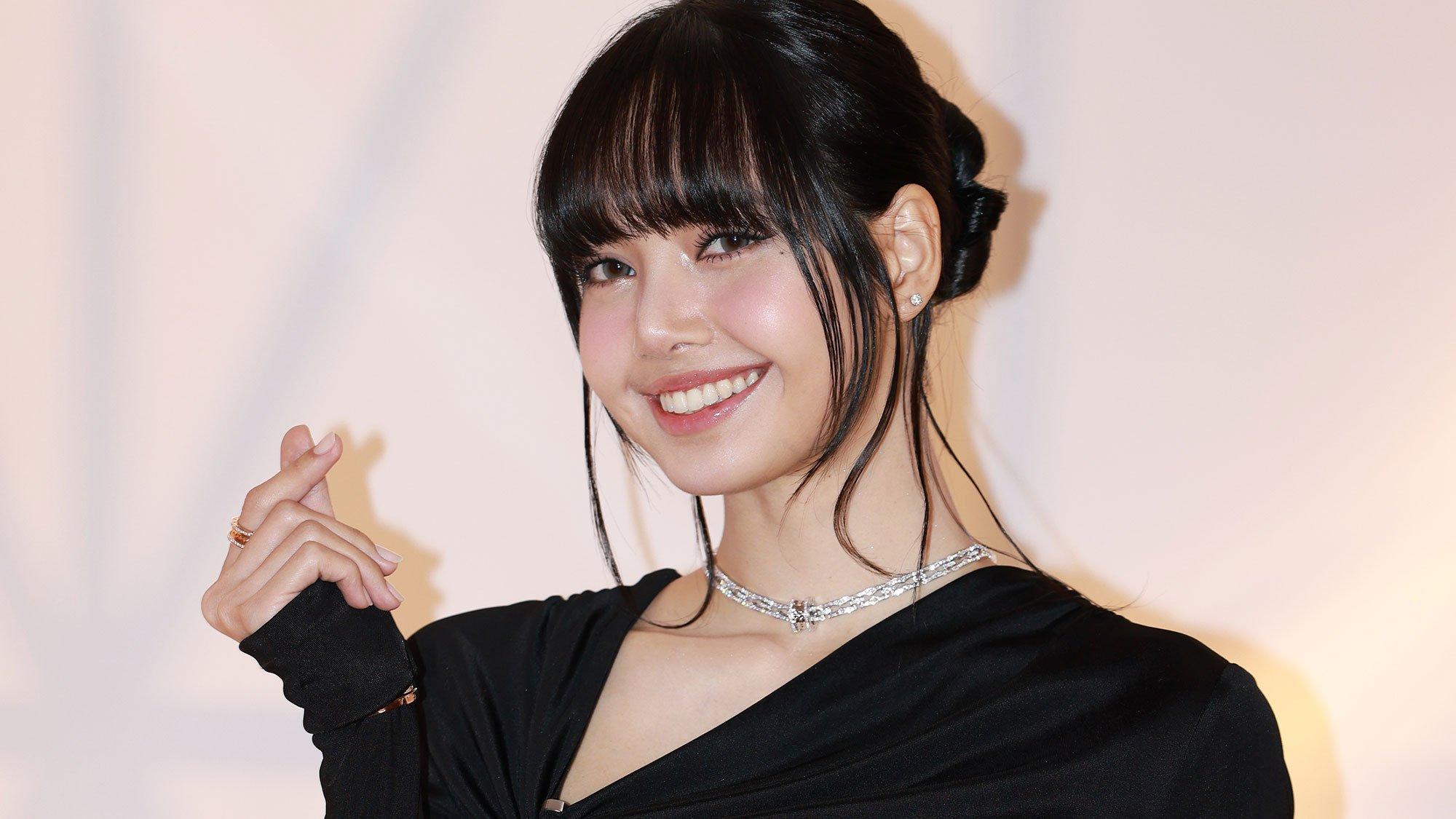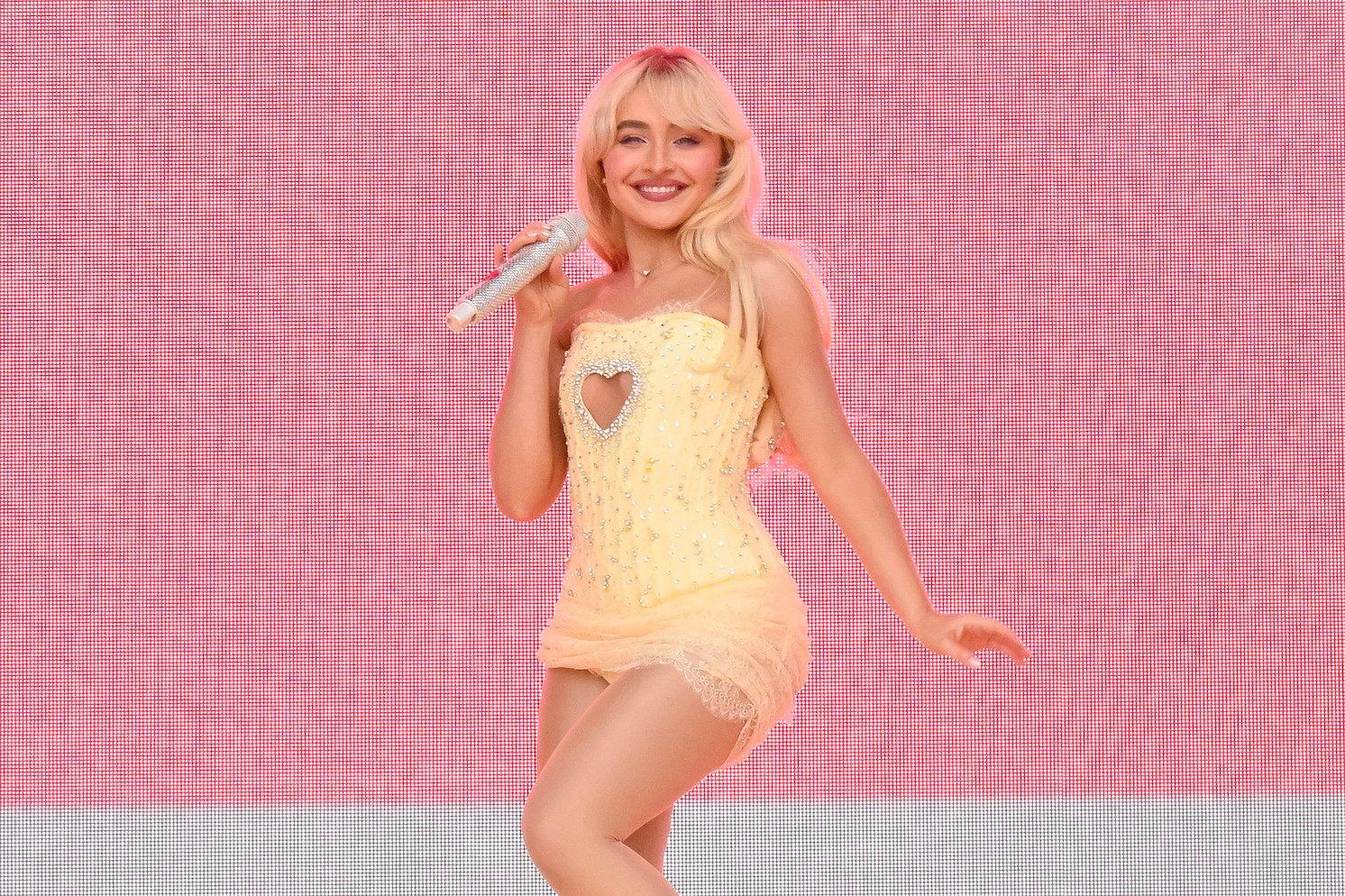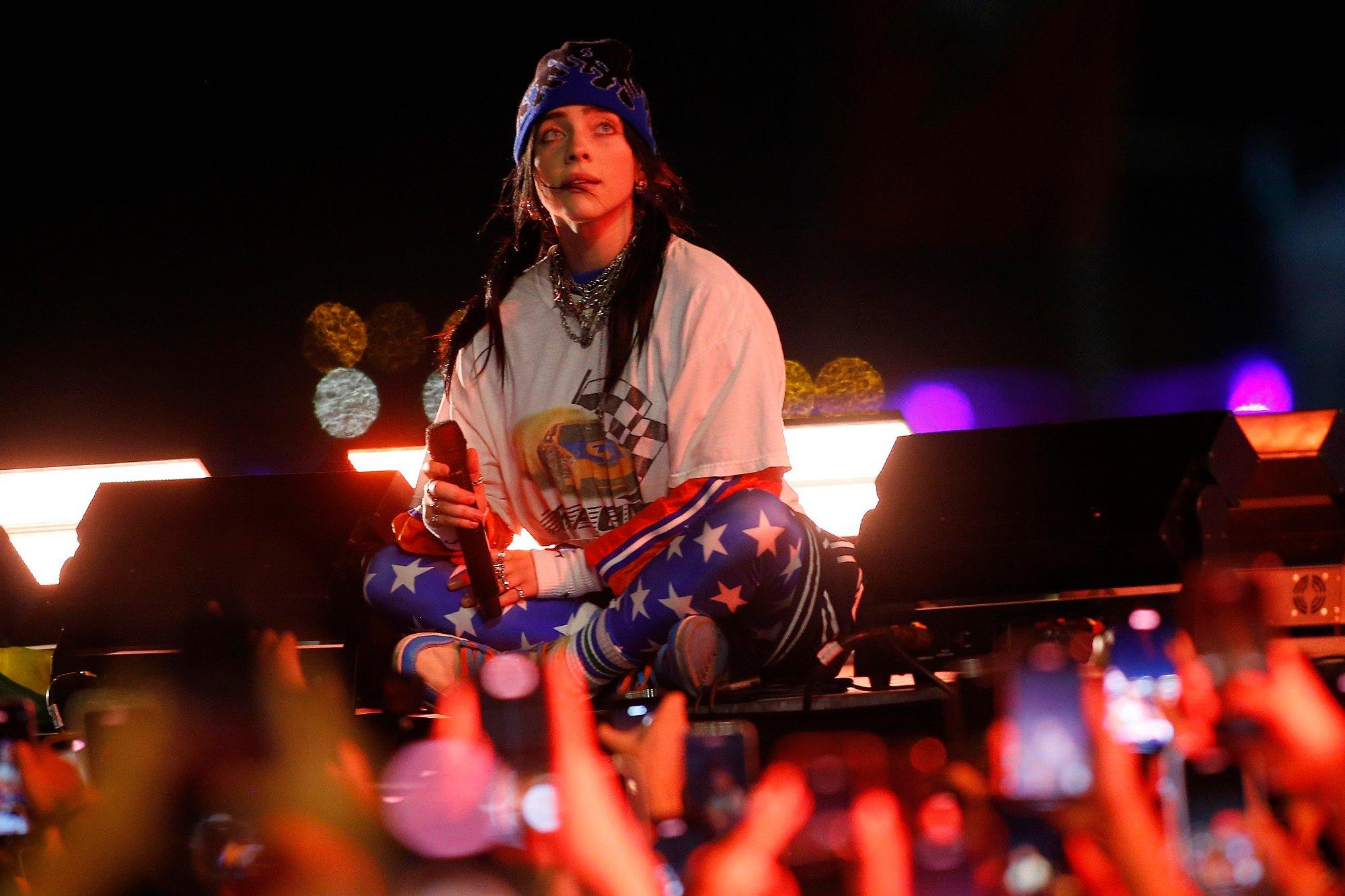At some point during the conversation, the topic of the pressure of being BLACKPINK comes up. There’s a short silence on the other end of the call. Starkly different from the effervescent laughs until then, it’s pregnant with introspection as the four members of BLACKPINK—Lisa, Jennie, Jisoo and Rosé—think about the title that’s most often associated with their name: "The Biggest Girl Group In The World."
It isn't hyperbole, either. A look at the numbers is enough to prove that. Within 24 hours of its release earlier in June, the first pre-release single from The Album, "How You Like That," broke five Guinness World Records. With 86.3 million views in that time, it became the most viewed YouTube video and the most viewed music video in the world. "How You Like That" also debuted at No. 33 on the Billboard Hot 100, tying with Lady Gaga’s "Sour Candy"—a song the group featured on—making BLACKPINK the highest-ranking female Korean act at the time.
Earlier in 2019, the quartet became the first K-pop group to hit 1 billion views on Youtube with their single "Kill This Love." They followed it up with a sizzling performance of the single at Coachella, making history again as the first K-pop girl group to do so.
Along with the weight of the epithet, thus, the title encompasses a vast journey that the quartet has covered in just a fraction of the time it takes established acts—four years to be precise. So, excuse the members of BLACKPINK for taking a couple seconds to reflect, please.
<style>.embed-container { position: relative; padding-bottom: 56.25%; height: 0; overflow: hidden; max-width: 100%; } .embed-container iframe, .embed-container object, .embed-container embed { position: absolute; top: 0; left: 0; width: 100%; height: 100%; }</style><div class='embed-container'><iframe src='https://www.youtube.com/embed/ioNng23DkIM' frameborder='0' allowfullscreen></iframe></div>
"It's very surprising to us," Jennie says at last. "Every day we try to acknowledge how grateful we are, but more than the pressure, we are ready to give them back as much as they [their fans, BLINKs] gave us. It just gives us more motivation to go further than we ever dreamed of."
If you’ve been acquainted with the BLACKPINK ethos, you will have seen this coming. For the better part of four years, the members of BLACKPINK have stood tall on the backs of the self-assured, self-aware messages in their music. Whatever the challenge, the BLACKPINK way is to always go up. Now, as they get ready to reacquaint themselves with the world with their first full-length release, The Album, the same determination abounds.
"We tried to put more colors into our music, say black and pink," says Lisa. "I wish each member has a stronger presence on the stage and explores more various genres. I hope people don’t know what to expect from us, except for something better than before. We want to be unpredictable."
Ahead of the release of The Album, GRAMMY.com sat down with BLACKPINK to discuss their career, achievements, motivations and future.
This is going to be your first full-length album after your debut, so the hype is very real. What was the mood when you heard it was happening?
Rosé: At the very start, when they said that we were going to [be releasing] our first album, we were very stoked, because we do know that our fans have been waiting for this moment for a very, very long time. We were very excited but also nervous at the same time because we do know that it is a big deal. It's the first time we were able to put all of our colors into something. We had mixed feelings, but overall it was very positive vibes, and we were very stoked to be able to finally release the full album.
The Album is coming after almost four years of your debut, which is a long time. Why do you think that this is the right moment for it?
Rosé: We had four years to kind of build our own colors as BLACKPINK. Throughout the four years, we got to explore different genres and really find out our exact, distinct colors. So, I feel like [in] this album, we were able to put our prepared music style and contribute with new music genres that we're still exploring recently. [That's why] I think now is the best time to come out, because any later would be too late and any earlier, we might have been in a rush. We definitely feel like, right now, we are fully ready to put out a full completed album.
How do you think this album represents the kind of artists you are? How does it represent your colors?
Jennie: I think we've said this before, but our new album is full of surprises. We like to believe that it's something no one has tried before. We just want to bring something new. The album is cool, you know, and we tried to put together all the colors of BLACKPINK that we've built before into one.
You started this year with some amazing collaborations. What do you look for while working with other artists? Where is that middle ground between your style and their style?
Jennie: Since there are already four of us, we're very adjusted to working with people, so somebody new is always welcome. They bring a new perspective to the group, and it's an amazing experience. It's like stepping outside of our usual boundaries and into a world that we haven’t been to. To create something new with a great artist, like Lady Gaga and Dua [Lipa] and much more to come, it's just a great chance for us as artists and groups.
<style>.embed-container { position: relative; padding-bottom: 56.25%; height: 0; overflow: hidden; max-width: 100%; } .embed-container iframe, .embed-container object, .embed-container embed { position: absolute; top: 0; left: 0; width: 100%; height: 100%; }</style><div class='embed-container'><iframe src='https://www.youtube.com/embed/fnPn6At3v28' frameborder='0' allowfullscreen></iframe></div>
How was working on The Album different to working on your previous EPs? The Album is more cohesive, it's longer; there are more songs, more opportunities. What was that like?
Rosé: Definitely, because it's not like separate projects that we were working on. In the past, when we were working on individual projects, it was mainly all about that "one" song or that "one" concept that we were coming out with. But, because this was an album, we really had to think about the flow and the meaning behind this. I feel like this time around, we do have personal songs in there, something that tells our story, something that is fun.
And since our name is BLACKPINK, we represent the diversity in our personalities as individuals and as artists. So, we feel like we really had to put that forward and address that as well as we could.
You told me how the album went from concept to final form and how you showed your colors; are there any parts of the production process that you paid special attention to?
Rosé: I feel like we stayed in the studio for a while. We didn't want to just have a bunch of tracks and songs written for us and for us just go and record. We did spend a lot of time in the studio trying to find what we really wanted to sing about, what kind of music we wanted to put out. It took us a while to get together a list of good songs so we could get into recording mode. That's the really big process: just hanging out in the studio and making sure we have fun there so we can be honest.
Let's talk a little bit about your recent achievements. You've broken records that at one point a lot of people thought were unachievable, especially for Asian artists. You performed at Coachella, you’re the most followed K-pop act on YouTube, "How You Like That" broke so many records right after its release. In context of all that, the pressure of being BLACKPINK must be so intense.
Jennie: It's very surprising to us. All the records are the results of our fans, BLINKs, and their unconditional support. Every day we try to acknowledge how grateful we are, but more than the pressure, we are ready to give them back as much as they gave us. It just gives us more motivation to go further than we ever dreamed of.
<style>.embed-container { position: relative; padding-bottom: 56.25%; height: 0; overflow: hidden; max-width: 100%; } .embed-container iframe, .embed-container object, .embed-container embed { position: absolute; top: 0; left: 0; width: 100%; height: 100%; }</style><div class='embed-container'><iframe src='https://www.youtube.com/embed/AX3Bsiq-13k' frameborder='0' allowfullscreen></iframe></div>
There's always a line between the persona and the person, so how do you make sure that the expectations people have of you are realistic, that what is going on in your professional life is either a reflection of who you are or a separation from it?
Jisoo: We are grateful, as artists, as individuals, that people have such big expectations of us, and we are ready to take on the burden that comes with the expectations. We chose to do this: we try to send that message in our music, to show our confidence and the boldness to take on the challenge.
I feel like you’ve gone beyond the concept of a traditional girl group now. BLACKPINK is not just a name, it’s sort of become a force of nature where everybody knows who you are. With a position like that, there's always a danger of thinking: "I'm fine here. I'm good. This is comfortable." The position limits growth. How do you guys ensure that you always keep on reinventing?
Rosé: While we are very grateful for the amount of things that we have achieved and everything that follows this, we are just four girls who always really loved music and we just enjoyed performing. So [staying] creative is not too hard, because once we do one thing, we are always looking at the next thing, always dreaming of things that we have always wanted to do. But we definitely don't settle with what we have right now. We're all very greedy when it comes to. [Laughs.]
Jennie: We have each other to look and be inspired by. We let each other know what we're doing and where to head.
Lisa: We're like the same person.
Rosé: I think all of our members try to remind each other of how we're all just human. The hype, we try not to let it get to us. We don't really go: "Oh my god, we broke these many records or da di da..." We just look at each other and like…
Jisoo: We're just happy with how far we've come.
How do you think you've grown since your trainee days?
Rosé: We definitely have become a little more professional when it comes to this job, I guess? When we were trainees, we were only training for the music. This job is actually a job.
Jennie: There is much more stuff to care about than just music, but to carry ourselves as somebody to influence or [somebody to] look up to.
Lisa: We just enjoy every little step of it, and when we're off camera, we're pretty much like, still four girls.
Rosé: Teenage girls. [Laughs.]
<style>.embed-container { position: relative; padding-bottom: 56.25%; height: 0; overflow: hidden; max-width: 100%; } .embed-container iframe, .embed-container object, .embed-container embed { position: absolute; top: 0; left: 0; width: 100%; height: 100%; }</style><div class='embed-container'><iframe src='https://www.youtube.com/embed/vRXZj0DzXIA' frameborder='0' allowfullscreen></iframe></div>
Tell me how you're going to relax after the album comes out. Will there be a party, or a girls' night in?
Rosé: The crazy thing is right after our album releases, we're going to be promoting it and trying to get as much content out there for our fans. Definitely there will be a celebration at some point, but I still think we will be at working mode.
Jennie: But an excited working mode, since our fans have the album in their hand.
Lisa: [From the back] We're workaholics!
Rosé: And our biggest celebration is kind of like, staying at home in bed. Sleeping all day, so that's going to happen, hopefully.
A lot of your plans for promotion might have been thrown off course with COVID. How does this synergy with fans affect your performance? What are you expecting this time around?
Jisoo: Even though the opportunity for us to meet our fans in person has decreased, we're very grateful for social media at this point. I actually feel like since we do have social media we have more of a platform to connect with our fans on a bigger scale, so we're grateful for that at this point in time. We just hope to reach out to our fans and give them more hope through our music and content.
<style>.embed-container { position: relative; padding-bottom: 56.25%; height: 0; overflow: hidden; max-width: 100%; } .embed-container iframe, .embed-container object, .embed-container embed { position: absolute; top: 0; left: 0; width: 100%; height: 100%; }</style><div class='embed-container'><iframe src='https://www.youtube.com/embed/2S24-y0Ij3Y' frameborder='0' allowfullscreen></iframe></div>
You guys are in a position where you are some of the people spearheading the modern K-pop expansion. Since your debut, we have seen K-pop grow so much. What kind of responsibility do you think you personally have towards its global expansion?
Rosé: It's amazing that K-pop is spreading around the world as a culture in itself. There are a lot of other K-pop artists out there who are trying to put out their music right now, and we are really grateful that we get to step in and be a part of that.
Jennie: Since we get such amazing opportunities and records because of the people that are interested in watching K-pop right now, we'd like to take the responsibility. We are fully committed to the work. We want to be proud when we look back on our history when we grow old.
[Rosé laughs.]
Jennie: We want to be proud of ourselves. I don't want to let ourselves down, so we put extra time, extra effort into every single thing we put out. I think that's why it takes a bit of time for us, but we really want to perfect the quality of the stuff we put out, so we can be represented to the world as a K-pop group.
Rosé: It's amazing how things are going. It's a big responsibility but a good responsibility that we have.
SuperM Talk 'Super One' & Finding Unity In The Covid Era






















